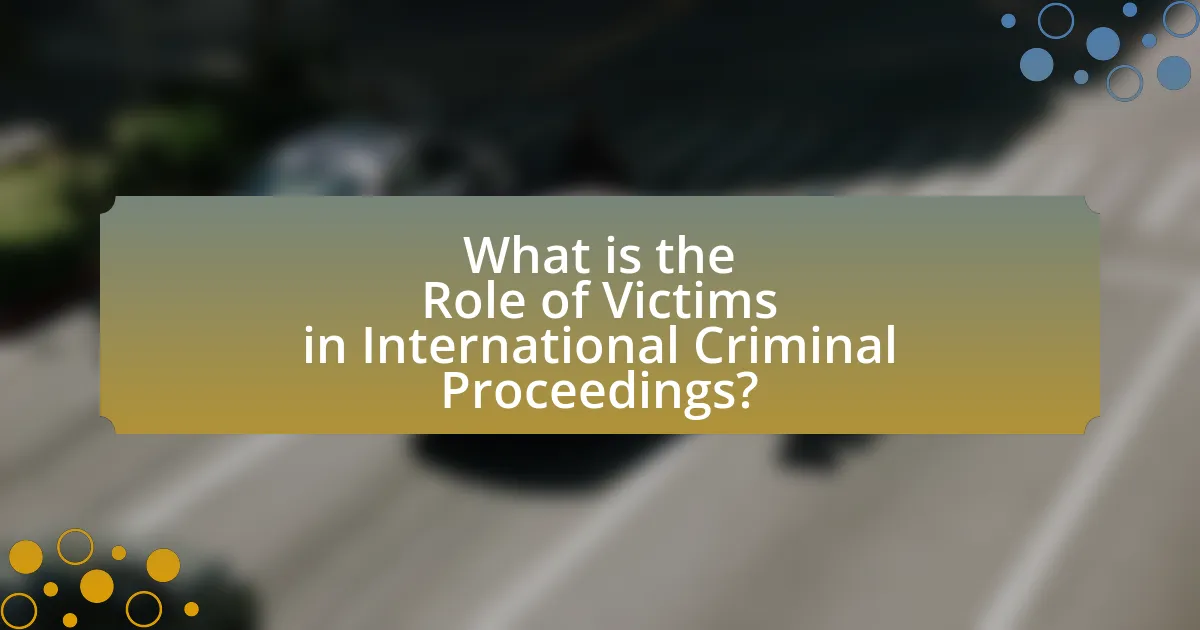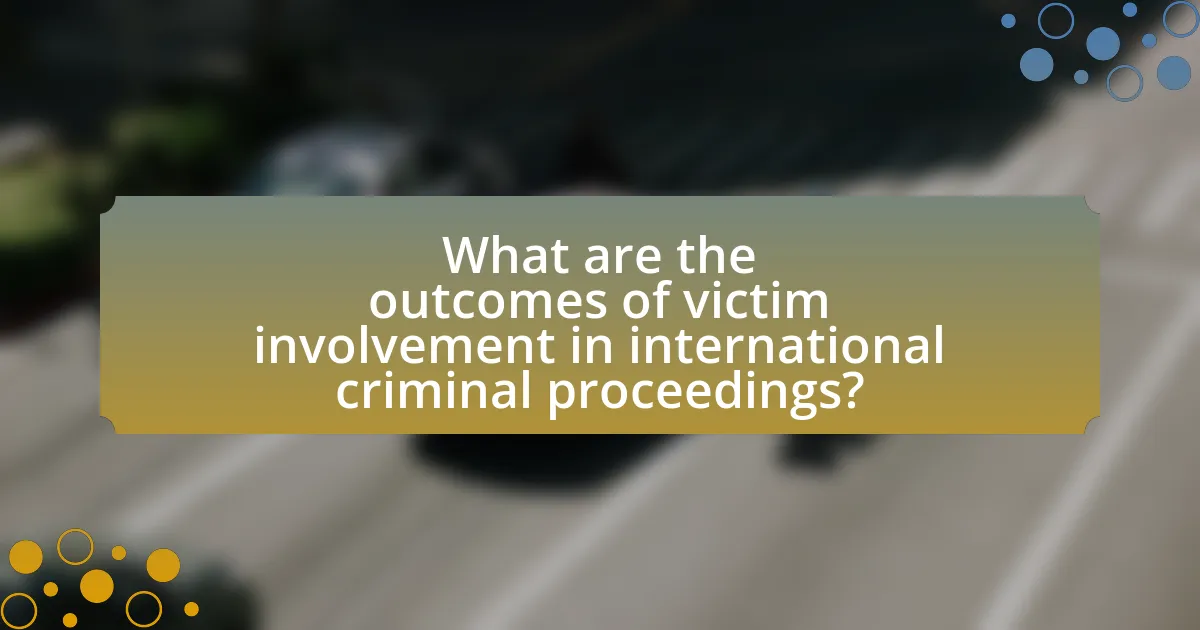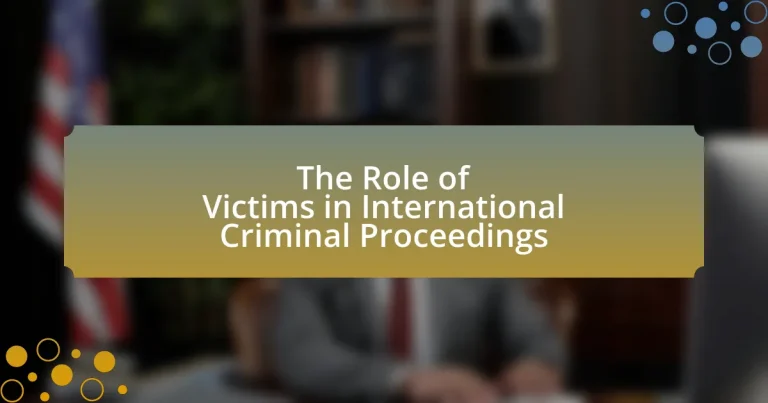The article examines the critical role of victims in international criminal proceedings, highlighting their participation in the judicial process, the provision of testimony, and the pursuit of reparations. It defines victims within the context of international law, outlines the criteria for victim status, and discusses the varying interpretations across jurisdictions. The article emphasizes the importance of victim inclusion for enhancing the legitimacy of international courts, the rights afforded to victims, and the mechanisms that facilitate their participation. Additionally, it addresses the challenges victims face, the psychological impacts of their involvement, and best practices for improving victim support services in the justice system.

What is the Role of Victims in International Criminal Proceedings?
Victims play a crucial role in international criminal proceedings by participating in the judicial process, providing testimony, and seeking reparations. Their involvement is recognized in various legal frameworks, such as the Rome Statute of the International Criminal Court, which allows victims to present their views and concerns during trials. This participation not only aids in establishing the facts of the case but also ensures that the voices of those affected by crimes are heard, contributing to a more comprehensive understanding of the impact of the crimes. Furthermore, victims can apply for reparations, which underscores their significance in the pursuit of justice and accountability.
How are victims defined within the context of international criminal law?
Victims within the context of international criminal law are defined as individuals who have suffered harm as a result of crimes under international law, such as genocide, war crimes, and crimes against humanity. This definition encompasses not only direct victims of these crimes but also those who have suffered harm as a result of the actions of the perpetrators, including family members and dependents. The International Criminal Court (ICC) recognizes victims’ rights to participate in proceedings and seek reparations, as outlined in the Rome Statute, which emphasizes the importance of acknowledging and addressing the suffering of victims in the pursuit of justice.
What criteria determine victim status in international criminal proceedings?
Victim status in international criminal proceedings is determined by criteria that include direct harm from the crime, the nature of the crime, and the legal framework of the court. Specifically, individuals must demonstrate that they suffered physical, psychological, or economic harm as a result of the criminal acts under investigation. The International Criminal Court (ICC) defines victims as persons who have suffered harm due to the commission of a crime within its jurisdiction, as outlined in Article 68 of the Rome Statute. This legal definition is supported by case law and procedural rules that establish the rights of victims to participate in proceedings and seek reparations.
How do different jurisdictions interpret the concept of victims?
Different jurisdictions interpret the concept of victims in varied ways, often influenced by legal traditions and cultural contexts. For instance, in the United States, victims are typically defined as individuals who suffer harm due to criminal acts, with specific rights outlined in the Victims’ Rights Act of 2004, which emphasizes their role in the criminal justice process. In contrast, the International Criminal Court (ICC) recognizes victims not only as those directly harmed but also includes those who have suffered indirect harm, as stated in the Rome Statute, which allows for victim participation in proceedings. Additionally, civil law jurisdictions, such as those in France, may focus on the victim’s role in seeking restitution and compensation, reflecting a more restorative approach. These interpretations highlight the diverse legal frameworks and societal values that shape the understanding of victims across different jurisdictions.
Why is the inclusion of victims important in international criminal proceedings?
The inclusion of victims is important in international criminal proceedings because it ensures that their voices are heard and their experiences are acknowledged in the justice process. This inclusion promotes a more comprehensive understanding of the impact of crimes, as victims provide essential testimony and context that can influence the outcome of cases. Furthermore, recognizing victims’ rights fosters a sense of justice and healing, which is crucial for societal reconciliation after conflicts. Studies, such as those conducted by the International Criminal Court, demonstrate that victim participation can enhance the legitimacy and effectiveness of legal proceedings by making them more inclusive and representative of the affected communities.
What impact does victim participation have on the justice process?
Victim participation significantly enhances the justice process by ensuring that the voices and experiences of victims are acknowledged and integrated into legal proceedings. This inclusion fosters a sense of empowerment among victims, which can lead to increased satisfaction with the justice system. Research indicates that when victims are allowed to participate, it can improve the quality of evidence presented, as victims often provide crucial insights that may not be available through other sources. For instance, a study published in the International Review of Law, Computers & Technology highlights that victim testimonies can lead to more comprehensive case outcomes and contribute to the overall legitimacy of the judicial process.
How does victim involvement contribute to the legitimacy of international courts?
Victim involvement enhances the legitimacy of international courts by ensuring that the perspectives and experiences of those affected by crimes are acknowledged and integrated into judicial processes. This inclusion fosters a sense of justice and accountability, as victims can provide crucial testimony and insights that inform the court’s understanding of the impact of crimes. For instance, the International Criminal Court (ICC) allows victims to participate in proceedings, which not only validates their experiences but also reinforces the court’s commitment to addressing the needs of those harmed. Studies have shown that when victims are actively involved, public trust in the judicial system increases, as seen in various cases where victim testimonies have led to more comprehensive rulings. This participatory approach ultimately strengthens the perception of fairness and justice in international legal frameworks.
What rights do victims have in international criminal proceedings?
Victims in international criminal proceedings have specific rights that include the right to participate in the proceedings, the right to be informed, the right to protection, and the right to seek reparations. These rights are established under various international legal frameworks, such as the Rome Statute of the International Criminal Court, which explicitly recognizes the importance of victim participation and protection. For instance, Article 68 of the Rome Statute ensures that victims can present their views and concerns at different stages of the proceedings, thereby allowing them to engage actively in the justice process. Additionally, victims have the right to receive information about the progress of the case and to be protected from intimidation and retaliation, which is crucial for their safety and well-being. Furthermore, victims can claim reparations for the harm suffered, as outlined in Article 75 of the Rome Statute, which emphasizes the court’s responsibility to address the needs of victims through compensation and rehabilitation.
What are the legal frameworks that protect victims’ rights?
Legal frameworks that protect victims’ rights include international treaties, national laws, and judicial mechanisms. The United Nations Declaration of Basic Principles of Justice for Victims of Crime and Abuse of Power establishes fundamental rights for victims, including access to justice and fair treatment. Additionally, the Rome Statute of the International Criminal Court provides specific provisions for victims, allowing them to participate in proceedings and seek reparations. National laws, such as the Victims’ Rights Act in the United States, further reinforce these protections by ensuring victims have rights to information, protection, and support throughout the legal process. These frameworks collectively aim to uphold the dignity and rights of victims in both domestic and international contexts.
How are victims’ rights enforced in practice?
Victims’ rights are enforced in practice through legal frameworks, advocacy organizations, and judicial mechanisms that ensure their participation and protection in international criminal proceedings. Legal instruments such as the Rome Statute of the International Criminal Court explicitly recognize victims’ rights to participate in proceedings, seek reparations, and receive support services. For instance, Article 68 of the Rome Statute mandates that the Court take appropriate measures to protect the safety, physical and psychological well-being, dignity, and privacy of victims. Additionally, organizations like the International Federation for Human Rights and various NGOs work to monitor compliance with these rights and provide support to victims, ensuring that their voices are heard and their rights upheld in practice.

How do victims participate in international criminal proceedings?
Victims participate in international criminal proceedings primarily through the right to be heard and to seek reparations. They can provide testimony, submit evidence, and engage in legal representation to ensure their voices are included in the judicial process. For instance, the International Criminal Court (ICC) allows victims to present their views and concerns during trials, which is established under Article 68 of the Rome Statute. This participation is crucial as it acknowledges the impact of crimes on victims and facilitates their access to justice.
What mechanisms exist for victim participation in trials?
Victim participation in trials is facilitated through mechanisms such as legal representation, victim impact statements, and the right to present evidence. Legal representation allows victims to engage in the judicial process, ensuring their voices are heard and their rights are protected. Victim impact statements enable victims to convey the emotional and psychological effects of the crime during sentencing, influencing the court’s decisions. Additionally, victims may have the opportunity to present evidence, which can contribute to the overall case and provide a more comprehensive understanding of the impact of the crime. These mechanisms are established in various international legal frameworks, including the Rome Statute of the International Criminal Court, which explicitly recognizes the rights of victims to participate in proceedings.
How can victims submit evidence or testimonies?
Victims can submit evidence or testimonies through designated channels established by international criminal tribunals. These channels often include formal submissions to the court, where victims can provide written statements, documents, or other relevant materials that support their claims. For instance, the International Criminal Court (ICC) allows victims to submit their evidence directly to the court through their legal representatives, ensuring that their voices are heard in the proceedings. This process is crucial as it enables victims to participate actively in the justice process and contributes to the overall integrity of the case being prosecuted.
What role do victim advocates play in the proceedings?
Victim advocates play a crucial role in international criminal proceedings by providing support, guidance, and representation for victims throughout the legal process. They assist victims in understanding their rights, navigating the complexities of the judicial system, and ensuring that their voices are heard during trials. Victim advocates also help victims access necessary resources, such as counseling and legal assistance, which can be vital for their emotional and psychological recovery. Their involvement is essential for promoting the inclusion of victim perspectives in proceedings, thereby enhancing the overall justice process and ensuring that victims receive the recognition and reparations they deserve.
What challenges do victims face in international criminal proceedings?
Victims in international criminal proceedings face numerous challenges, including limited access to justice, emotional and psychological trauma, and difficulties in navigating complex legal systems. Limited access to justice often arises from procedural barriers, such as the requirement for victims to prove their standing in court, which can be daunting and discouraging. Emotional and psychological trauma is exacerbated by the lengthy and public nature of trials, which can force victims to relive their experiences. Additionally, the complexity of international legal frameworks can hinder victims’ understanding of their rights and the proceedings, making it challenging for them to effectively participate. These challenges are documented in various studies, including reports from the International Criminal Court, which highlight the need for reforms to better support victims in these processes.
How do cultural and social factors affect victim participation?
Cultural and social factors significantly influence victim participation in international criminal proceedings by shaping victims’ perceptions of justice and their willingness to engage with legal processes. For instance, in collectivist cultures, victims may prioritize community harmony over individual justice, leading to reluctance in participating in adversarial legal systems. Additionally, social stigma associated with victimization can deter individuals from coming forward, particularly in societies where victims are blamed for the crimes against them. Research indicates that victims from marginalized communities often face barriers such as discrimination and lack of access to legal resources, further impacting their participation rates. These dynamics illustrate how cultural norms and social structures can either facilitate or hinder victims’ involvement in seeking justice.
What are the psychological impacts of participating in such proceedings?
Participating in international criminal proceedings can lead to significant psychological impacts on victims, including trauma, anxiety, and a sense of empowerment. Victims often experience re-traumatization when recounting their experiences, which can exacerbate existing mental health issues. Research indicates that the stress of participation can lead to symptoms of post-traumatic stress disorder (PTSD), as victims may relive traumatic events during testimonies. Conversely, some victims report feelings of empowerment and validation when their voices are heard in a formal legal setting, contributing to a sense of justice. A study by the International Criminal Court found that 70% of victims felt a sense of closure after participating in proceedings, highlighting the dual nature of psychological impacts.

What are the outcomes of victim involvement in international criminal proceedings?
Victim involvement in international criminal proceedings leads to enhanced justice, increased accountability, and improved victim satisfaction. When victims participate, they contribute to the establishment of facts and provide crucial testimonies that can influence the outcome of cases. Research indicates that their involvement can also foster a sense of empowerment and validation, as seen in the International Criminal Court’s practices, where victims have the right to present their views and concerns. Furthermore, studies show that victim participation can enhance the legitimacy of the judicial process, as it reflects a more comprehensive approach to justice that acknowledges the experiences of those affected by crimes.
How does victim participation influence trial outcomes?
Victim participation significantly influences trial outcomes by enhancing the perceived legitimacy and fairness of the judicial process. When victims are allowed to engage in trials, they contribute to a more comprehensive understanding of the impact of the crime, which can lead to more informed decisions by judges and juries. Research indicates that trials involving victim participation often result in higher conviction rates, as the emotional and personal narratives provided by victims can sway juror perceptions and decisions. For instance, a study published in the Journal of Criminal Justice found that victim testimony increased conviction rates by approximately 20%, highlighting the critical role victims play in shaping trial dynamics and outcomes.
What are the potential benefits for victims in terms of restitution and reparations?
Victims can experience significant benefits from restitution and reparations, primarily through financial compensation and acknowledgment of their suffering. Restitution aims to restore victims to their original state before the harm occurred, which can include monetary payments for lost property or income. Reparations, on the other hand, provide broader support, including psychological counseling and community rebuilding efforts, which can help victims recover from trauma. Research indicates that such measures can enhance victims’ sense of justice and closure, as seen in various international tribunals where reparations have been implemented, such as the International Criminal Court’s Trust Fund for Victims, which has provided assistance to thousands of individuals affected by crimes.
How does victim involvement affect the perception of justice by the affected communities?
Victim involvement significantly enhances the perception of justice within affected communities. When victims participate in international criminal proceedings, they contribute to a sense of legitimacy and accountability, which fosters trust in the justice system. Research indicates that communities perceive justice as more meaningful when victims’ voices are heard and their experiences acknowledged, leading to greater community cohesion and support for legal outcomes. For instance, a study by the International Criminal Court (ICC) found that victim participation in trials positively influenced community attitudes towards the court and its processes, reinforcing the belief that justice is being served.
What best practices can enhance the role of victims in international criminal proceedings?
Best practices that can enhance the role of victims in international criminal proceedings include ensuring legal representation, providing psychological support, and facilitating victim participation in the judicial process. Legal representation allows victims to navigate complex legal frameworks effectively, as seen in the International Criminal Court, where legal aid has been crucial for victim engagement. Psychological support is essential for addressing trauma, which can improve victims’ ability to participate meaningfully; studies indicate that emotional well-being directly impacts their involvement in proceedings. Additionally, mechanisms for victim participation, such as allowing victims to present their views and concerns during trials, have been implemented in various tribunals, reinforcing their role and ensuring their voices are heard. These practices collectively contribute to a more inclusive and responsive justice system.
How can international courts improve victim support services?
International courts can improve victim support services by implementing comprehensive psychological and legal assistance programs tailored to the needs of victims. These programs can include trauma-informed care, legal representation, and access to mental health resources, which are essential for helping victims navigate the complexities of international criminal proceedings. For instance, the International Criminal Court has recognized the importance of victim participation and has established the Trust Fund for Victims, which provides support for rehabilitation and reparations, demonstrating a commitment to enhancing victim services. Additionally, training court personnel on the specific needs of victims can foster a more supportive environment, ensuring that victims feel heard and respected throughout the judicial process.
What strategies can be implemented to ensure meaningful victim participation?
To ensure meaningful victim participation in international criminal proceedings, strategies such as establishing clear communication channels, providing legal support, and facilitating victim empowerment should be implemented. Clear communication channels allow victims to understand the process and their rights, which is essential for informed participation. Providing legal support ensures that victims have access to representation and guidance, enabling them to navigate complex legal systems effectively. Facilitating victim empowerment through training and resources helps victims articulate their needs and perspectives, fostering a sense of agency. These strategies are supported by research indicating that informed and supported victims are more likely to engage actively in proceedings, thereby enhancing the overall justice process.


